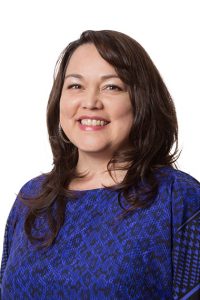Trudy Cardinal
Biography:
Trudy Cardinal PhD is a Metis/Cree associate professor from Northern Alberta who currently works at the University of Alberta, Edmonton. Originally from Slave Lake, she spent most of her life growing up in the communities of Wabasca, Slave Lake and High Prairie. She was an Elementary teacher for 13 years before going on to graduate school to obtain first her masters then her doctorate. As a former teacher, a mother, a grandmother, an aunty, and an Indigenous scholar she is dedicated to continuing to deepen understanding of the educational experiences of Indigenous children, youth and families. Of particular interest is the potential of Indigenous and relational pedagogies in the creation of an education system that honors the whole being of the learner. Also, drawing on her own identify focused research, in particular the ways Indigenous young women negotiate who they are and are becoming in the midst of the stories told to, by and about them, she co-created with her daughter Kyla, Braiding Stories to Live By ~ Indigenous Young Womens’ Gatherings. At the heart of all she does is a deep commitment to the experiences of current and future generations of Indigenous Peoples. This has led her to her current project with CRISM, Paspinam: Made it through the hardship which looks at the role of culture in the recovery from substance misuse through 4 generations.
Node Funded Project (September 2020)
Title: PASPINAM: Made it through the hardship
Principal Investigator: Trudy Cardinal, University of Alberta
Co-investigators/collaborators:
Elder JoAnn Saddleback, Elder Jerry Saddleback, Dr. Cam Wild
Description:
The intent of this CRISM research project is to inquire into the experiences of self-identified Indigenous Peoples who have engaged in Indigenous programs or drawn on Indigenous ways of being, knowing and doing, in their treatment of substance misuse. This project shifts away from a damage-centered research approach and instead is meant to focus on the strengths and experiences of the participants while looking at the role of culture in recovery from substance misuse over 4 generations. Using Narrative Inquiry Methods, the research team will inquire into participants’ ongoing experiences of returning to balanced wellness by drawing on the wisdom of Indigenous ways of being, knowing and doing. The aim is twofold: 1) to deepen understanding of the ways Indigenous wisdom has contributed to the healing journey, and 2) to support participants in sharing their stories, thereby honoring their voice and articulating how important their story is for the community and larger society. This research project has the potential to support Indigenous and non-Indigenous communities in their efforts to create wholistic wellness programs that better support their people and their ways of being, knowing and doing.



